2011高考英语备考BookII Unit17 Disabilities:知识搜索与探究归纳
高二英语Unit17 Disabilities知识精讲

高二英语Unit17 Disabilities知识精讲Language points:1. wish to dosb. to do sththat- clacuse(虚拟语气) did/had done/would(could, might) doe.g. How I wish every family _______ a large house with beautiful garden! BA. hasB. hadC. will haveD. had hadEx.我希望老师别把我们这些学生当做小孩子。
(wish, as if)I wish the teachers___________________________________________________________. (wouldn’t treat us students as if we were childrren)2. …as if/though…e.g. The man walks as if he ___________.那人走路的样子好象是喝醉了。
were drunk(事实上并没有醉)3. get around/round/about ①到处走动②(指消息等)传播出去③避开,逃避;绕过某困难He could get around/about again after the operation.Bad news gets around quickly.to get around the tax lawsto get around the problemEx. Mike现在感觉好多了,可以四处走动了。
Mike_____________________________________ now and he can _____________.(is feeling much better /get around)4. live a rich(happy/poor/meaningful/productive)… life5. make a contribution to…/make contributions to…/contribute toto 为介词的词组: pay attention to, adapt to, adjust to, be addicted to, devote oneself to, get used to, help oneself to, get down to(开始着手工作,认真处理某事)……6. launch a special education college AA. launch a new enterprise(企业)B. launch a shipC. launch a man-made satelliteD. launch one’s son into the worldE. launch an attack7. be gifted in…= have a gift for…8. assist (sb.) with sth.in doing sth.9. more than + n “不只是,不仅仅”=not onlye.g. Museum is ________ ________ a museum, ________ ________ we can learn a lot.(博物馆不仅仅是一个博物馆,从中我们能学到很多东西。
高中英语(人教大纲)第二册下:Unit17 Disabilities(第一课时)
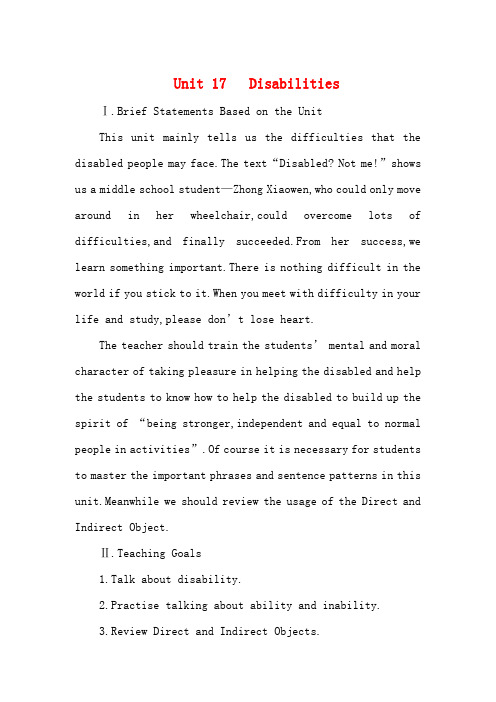
Unit 17 DisabilitiesⅠ.Brief Statements Based on the UnitThis unit mainly tells us the difficulties that the disabled people may face.The text“Disabled? Not me!”shows us a middle school student—Zhong Xiaowen,who could only move around in her wheelchair,could overcome lots of difficulties,and finally succeeded.From her success,we learn something important.There is nothing difficult in the world if you stick to it.When you meet with difficulty in your life and study,please don’t lose heart.The teacher should train the students’mental and moral character of taking pleasure in helping the disabled and help the students to know how to help the disabled to build up the spirit of “being stronger,independent and equal to normal people in activities”.Of course it is necessary for students to master the important phrases and sentence patterns in this unit.Meanwhile we should review the usage of the Direct and Indirect Object.Ⅱ.Teaching Goals1.Talk about disability.2.Practise talking about ability and inability.3.Review Direct and Indirect Objects.4.Write an argumentative essay.Ⅲ.Background Information1.Will Inspired LifeThe little country schoolhouse was heated by an old-fashioned,pot-bellied coal stove.A little boy had the job of coming to school early each day to start the fire and warm the room before his teacher and his classmates arrived.One morning they arrived to find the schoolhouse engulfed in flames.They dragged the unconscious little boy out of the flaming building more dead than alive.He had major burns over the lower half of his body and was taken to a nearby county hospital.From his bed the dreadfully burned,semiconscious little boy faintly heard the doctor talking to his mother.The doctor told his mother that her son would surely die—which was for the best,really—for the terrible fire had devastated the lower half of his body.But the brave boy didn’t want to die.He made up his mind that he would survive.Somehow,to the amazement of the physician,he did survive.When the mortal danger was past,he again heard the doctor and his mother speaking quietly.The mother was told that since the fire had destroyed so much flesh in the lower part of his body,it would almost be betterif he had died,since he was doomed to be a lifetime cripple with no use at all of his lower limbs.Once more the brave boy made up his mind.He would not be a cripple.He would walk.But unfortunately,from the waist down,he had no motor ability.His thin legs just dangled there,all but lifeless.Ultimately he was released from the hospital.Every day his mother would massage his little legs,but there was no feeling,no control,nothing.Yet his determination that he would walk was as strong as ever.When he wasn’t in bed,he was confined to a wheelchair.One sunny day his mother wheeled him out into the yard to get some fresh air.This day,instead of sitting there,he threw himself from the chair.He pulled himself across the grass,dragging his legs behind him.He worked his way to the white picket fence bordering their lot.With great effort,he raised himself up on the fence.Then,stake by stake,he began dragging himself along the fence,resolved that he would walk.He started to do this every day until he wore a smooth path all around the yard beside the fence.There was nothing he wanted more than to develop life in those legs.Ultimately through his daily massages,his iron persistence and his resolute determination,he did develop the ability to stand up,then towalk haltingly,then to walk by himself—and then—to run.He began to walk to school,then to run to school,to run for the sheer joy of ter in college he made the track team.Still later in Madison Square Garden this young man who was not expected to survive,who would surely never walk,who could never hope to run—this determined young man,Dr. Glenn Cunningham,ran the world’s fastest mile!2.Helen KellerHelen Keller(1880~1968) was a famous author and educator.She was stricken at the age of 19 months with an illness that left her deaf and blind.She became mute shortly thereafter.Her parents in 1887 got her a teacher Anne Mansfield Sullivan from the Perkings School for the Blind in Boston.A remarkable,close relationship developed between teacher and pupil.Within two years,Miss Keller was able to read and write in Braille.She graduated(1904)from Radcliffe College,where Miss Sullivan had spelled the lectures into her hand.Helen Keller devoted her life to publicly aiding the deaf and blind.With the aid of a translator,she toured the world to promote the education of persons similarly afflicted.She wrote numerous books,including“The Story of My Life”(1902).Ⅳ.Teaching Time:Four periodsThe First PeriodTeaching Aims:1.Learn and master the following:Phrases:deal with,overcome the difficultiesSentence Patterns:If you were in a wheelchair,you wouldn’t be able to…If I were blind,I would need a/an…2.Train the students’ listening ability.3.Improve the students’speaking ability by describing,talking and discussion.Teaching Important Points:1.Train the students’ listening ability.2.Make the students master the sentence patterns and describe the pictures freely.Teaching Difficult Point:How to improve the students’ speaking ability.Teaching Methods:1.Listening-and-answering activity to help the students go through with the listening materials.2.Individual,pair of group work to make every student work in class.Teaching Aids:1.a tape recorder2.the multimedia3.the blackboardTeaching Procedures:Step Ⅰ Greetings and Lead-inT:Good morning/afternoon,everyone.Ss:Good morning/afternoon,Mr/Ms.T:Sit down,please.First I want to ask you some questions.Have you been to some places of interest?Have you climbed the mountains?Ss:Yes.(Students may have different answers.)T:How can you get there?Ss:We can get to…by bus/by train/on foot…T:Now please look at the screen.(The teacher shows a picture of a wheelchair on the screen.)How do you say it in English?Ss:Wheelchair.T:What kind of people uses it?Ss:People with disabilities/who couldn’t stand up.T:Good.Now,tell me if you were in a wheelchair,would yoube able to get to some places like tall buildings,high mountains?Ss:I can go to…by myself,because there’s no step.It’s easy for me to get there.T:Who has different answers?S1:I can go to…with the help of my friends.They can carry me up there.S2:I can’t go to…,because it’s high on the top of the hill.What a pity!I can only look at it from far away.Step Ⅱ Warming upT:Today we’re going to learn Unit 17“Disabilities”.(Bb:Unit 17 Disabilities The First Period)First let’s look at some words.(Show the following on the screen)disability/,dIs′bIlItI/n.ability/′bIlItI/n.sidewalk/′saIdwk/n.escalator/′eskleIt (r)/n.elevator/′elIveIt (r)/n.(=lift)(Teacher teaches the words and explains them,then let the students look at the first four pictures on Page 49.)T:OK.Now I want you to discuss the first four pictures using the following sentences.1.Sentence Patterns:(1)If I were in a wheelchair,I would…(2)If I were blind,I wouldn’t…(Write them on the blackboard)Yeah,please discuss them in groups of four.After a while,everyone is asked to talk about the pictures.Is that clear?Ss:Yes.T:OK.Please work in groups and try to imagine what difficulties and dangers you might face.(After a while,teacher asks some students to talk about the pictures.If time permits,teacher may ask more students to answer.)T:Now time is up.Who wants to say first?S1:Picture 1.If I were in a wheelchair,I would not go to the public buildings because there were so many steps.S2:Picture 2.If I were blind,I might fall down when walking on the sidewalk as it’s not flat.(Or:There are some blocks.)S3:Picture 3.If I were disabled,I wouldn’t go to thetoilet,for the equipments are not fit for the disabled.S4:Picture 4.If I were in a wheelchair.I couldn’t ring in public places,because the public telephone is too high for me to reach.T:How hard they are!We pay little attention to them in our daily life.We must take effective measures to improve their conditions.Let’s see what changes have taken place.Please discuss in groups.In the meanwhile,we should notice the two phrases:deal with,overcome the difficulties.(Teacher writes the following on the blackboard.)(After a while,teacher asks some students to talk about the last four pictures.)T:Now.Any volunteer?S1:We should provide an entrance suitable for wheelchairs on the ground floor.S2:We should build a special sidewalk for the blind,and fix some feeling equipment.S3:We must provide suitable toilets for people withdisabilities,fixing two handrails.S4:We should set the public telephone in a proper place so that people in a wheelchair can reach it.T:They hope to lead a normal life as we do,so we should help them overcome the difficulties.Step Ⅲ ListeningT:Now please turn to Page 50.Let’s do some listening.You are going to hear John talking about his life.There are three questions for you to answer.You need to listen carefully.Is that clear?S:Yes.T:OK.Let’s begin.(Teacher plays the tape for the first time.Then play for the second time.During this time,teacher may pause for students to write down the information.Play some parts of the tape more times if necessary.Finally teacher checks the answers with the whole class.)Step Ⅳ SpeakingT:Please look at Speaking on Page 50.Now imagine you are disabled.Choose two of the situations below and discuss how you would deal with them.You may use the following sentence structures.(Show the structures on the screen.)T:OK.Please begin to discuss them.(Teacher goes among the students and listens to their discussions,then chooses several students to express their ideas in different ways.)Who can describe Situation 1?S1:I’ll try.If I were blind,it would be difficult for me to get there.But I would try my best.First I would walk down the familiar sidewalk with the aid of a walking stick.When crossing the street,I would ask others for help.Or I probably could get there by taxi.S2:Situation 2.If I were deaf,I would not be able to hear other players’ words.It would be difficult for us to work together.I would have to read their facial expressions and gestures.I think I’m more lucky than Helen Keller,for I can see.Ishould learn her spirit of studying,and try to imitate by looking at their mouths.I’m sure I would learn English well.S3:Situation 3.If I were in a wheelchair,I’m sure I would be able to go shopping,eat at a fast food restaurant and then go to a cinema with the help of my friends.First I would do my best to get to the steps of the building by myself,and then they could carry me up to the entrance of the lift.I’m sure I would be able to get there and have a good time.Step Ⅴ Summary and HomeworkT:In this class,we’ve done some listening and speaking.We’ve also talked about the situations of the disabled.Of course,we’ve learned some useful sentence patterns.After class,practise more talking about disability in English.Master the useful sentence patterns,(Teacher points to the blackboard.)and preview the reading material “Disabled?Not me!”.So much for today.Goodbye,everyone!Step Ⅵ The Design of the Writing on the BlackboardUnit 17 DisabilitiesThe First Period1.Sentence Patterns:(1)If I were in a wheelchair,I would…(2)If I were blind,I wouldn’t…2.(1)deal withe.g.How shall we deal with the problem?(2)overcome the difficultiesStep Ⅶ Record after Teaching。
高二英语Unit17 Disabilities知识点总复习教案

高二英语Unit17 Disabilities知识点总复习教案高二英语Unit17 Disabilities知识点总复习教案Setin III 词汇语法、综合技能18 Ever fur ears, entall disabled athletes e tgether t tae part in the Speial lpis 智障运动员每四年聚会一次,参加特殊奥运会。
(p Integrating Sill 第一段第1行) * ever的一种用法▲ 此处ever用在数词前,如ever t (three,et),意为“每两个(三……)个……”。
如:①I g there ever three das 我每三天去那里一次。
②The Aerian peple elet a president ever fur ears 美国人四年选一次总统。
③There is a bus t the statin ever ten inutes 每十分钟有一辆公共汽车进站。
④The stpped and rested ever five iles 他们每五英里停下休息一会儿。
⑤Nine en have lst bs fr ever five en 每五个男子失业就有九个女子失业。
【注】也可以跟序数词表示同样的意思。
如:①The lpis are held ever furth ear 奥林匹克运动会每四年举行一次。
②It has been sning, rughl ever third da 近大约每三天就要下一次雪。
【注】值得注意的是表示“每隔……”。
要用ever ther或ever send。
如“每隔一天”,要说ever ther da或ever send da。
①I ent he ever ther ee 我每隔一周回家一次。
②“Please rite ever ther line” said the teaher 老师说:“请隔行写”。
高二英语Unit17;Disabilities知识点总复习教案

高二英语Unit17;Disabilities学问点总复习教案高二英语unit17 disabilities学问点总复习教案section iii 词汇语法、综合技能18. every four years, mentally disabled athletes come together to take part in the special olympics. 智障运发动每四年聚会一次,参与特殊奥运会。
(p.55 integrating skill 第一段第1行) * every的一种用法▲此处every用在数词前,如every two (three,etc.),意为“每两个(三……)个……”。
如:① i go there every three days. 我每三天去那里一次。
② the american people elect a president every four years. 美国人四年选一次总统。
③ there is a bus to the station every ten minutes. 每特别钟有一辆公共汽车进站。
④ they stopped and reste d every five miles. 他们每五英里停下来休息一会儿。
⑤ nine women have lost jobs for every five men. 每五个男子失业就有九个女子失业。
【注】也可以跟序数词表示同样的意思。
如:① the olympics are held every fourth year. 奥林匹克运动会每四年举办一次。
② it has been snowing, roughly every third day. 近来大约每三天就要下一次雪。
【注】值得留意的是表示“每隔……”。
要用every other或every second。
如“每隔一天”,要说every other day或every second day。
高二英语 Unit17 Disabilities
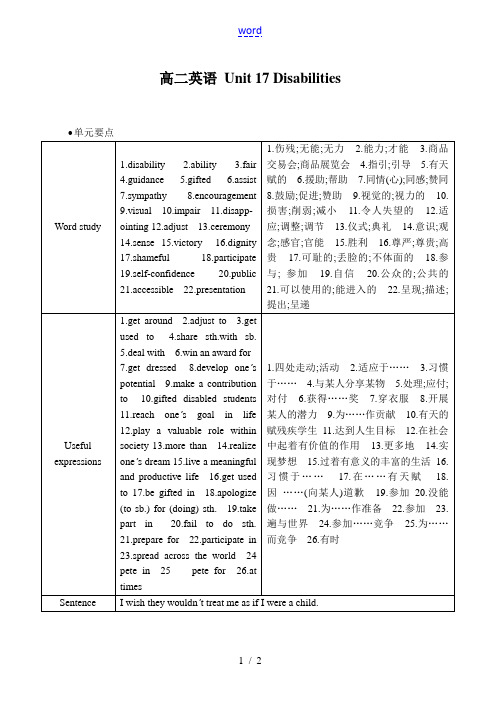
Topics and Writing
1.Talk about disability.
2.Practise talking about ability and inability.
3.Review Direct and Indirect Objects.
I could…
I would need help to…
It would be difficult to…
I would try to…
I would need a/an…
Grammar
直接宾语和间接宾语
直接宾语表示动作的承受者物动词+间接宾语(sb.)+直接宾语(sth.)
Sentence
I wish they wouldn’t treat me as if I were a child.
Patterns &
Comunicactive
English
1.They need recognition,more than sympathy and help.
2.It is also often disappointing to find that other people do not feel comfortable together with someone who is disabled.
ointing 12.adjust 13.ceremony
14.sense 15.victory 16.dignity17.shameful 18.participate 19.self-confidence 20.public 21.accessible 22.presentation
(整理版高中英语)第二册Unit17DiSablities

第二册Unit 17 DiSab-litiesI.单元知识点全览工欲善其事必先利其器高考须掌握的词汇:1.disablcd 2.abled 3.guide 4.gift 5.assistance,6.sympathize;.sympathetic 7.encourage8.conduction 9.Access 高考须掌握的短语:1.around,/about 2.usedⅡ.考点过关过关斩将一马平川考点详解精剖细解入巿三分一、重点词汇.1.assist vt.&.vi帮助;援助eg:She asked us to assist her in carrying out the plan.她要我们帮她实施那个方案。
Two Studenls assisted me with the experiment.两个学生帮助我做这个实验。
A good dictionary will assist you to understand English.好词典会帮助你理解英文。
相关链接:assistant n.助手,助理assistance n.帮助,援助[U]用法拓展:assist sb.with sth.帮助某人做某事assist sb.in doing sth.帮助某人做某事assist sb.todo sth.帮助某人做某事 assist in(-doing)sth.帮助做某事案例剖析旁征博引举一反三考题1 (典型例题To our joy. they all in mendmg the toof yesterday.A.aided B.helped c suPporled Dassisted考题1点拨:答案为D。
此题考查动词词义辨析。
aid表示“援助"构成aid sb.in doing.sth.;help sb.(to)do/help sb.with sth.表示“帮助某人干某事〞;support表示“支持〞,是及物动词?在此搭配不对;而assistl既可作及物动词也可作不及物动词,构成assist in doing sth.表示“帮助干某事〞。
高二英语Unit17 Disabilities知识精讲 人教版

高二英语Unit17 Disabilities知识精讲人教版一. 本周教育内容:Unit 17—Disabilities1. 重点单词短语用法讲解2. 课文难点句解析二. 知识总结与归纳:单元内容简介:〔一〕主题:本单元中心话题是“残疾〞,涉与到“残疾人的生活;如何关心残疾人;特奥会〞等内容的阅读材料。
〔二〕本单元涉与到的语法现象:1. 复习直接宾语和间接宾语2. 虚拟语气句型3. 定语从句4. 动名词做主语,介词宾语。
〔三〕本单元应掌握的重点短语:1. get around2. live a …life3. make a contribution to sth.4. reach one’s goal5. live with6. adjust to….7. get used to ….8. fail to do sth.9. have sympathy for sb.10. participate in….11. conduct oneself12. make a survey of the public opinion〔四〕重点词汇,短语用法:1. get around / about:四处走动;活动,〔消息〕四处传开。
She uses a wheelchair to get around and it often takes her a little longer to do everyday things.She’s eighty now, and doesn’t get around much any more.News of accident soon got around.get的其他短语:get stuckget tired of sth./ doing…get used to sth. / doingget into the habit of….get down to sth. / doing…get along / on with….get over….get through:2. assist:帮助;援助;常用的短语有:assist sb. in doing sth. assist in doing… assist sb. with sth.They not only learn how to assist disabled people, but also learn the importanceof cooperating to reach their goals in life.They were assisted in learning to live in the new land by the Indians.Two students assisted me with this experiment.3. sympathy:同情〔心〕;同感常用的短语:have / feel sympathy for / with sb.in / with sympathy; be in sympathy with…..:赞同,与……一致。
高中英语Unit 17 Disabilities 2人教版第二册(下)

Unit 17 DisabilitiesPeriod Two ReadingII. Teaching procedures.Activity 1. Check the assignment.Activity 2. Pre-readingHave a discussion and answer the following questions on p51.Suggested answers:1)Yes. I know a person with disability. He has learnt to do many things without help. He can take care of himself at home, but getting around in the city in a wheelchair is often frustrated. He loves reading stories of young disabled people who have overcome great difficulties.2).Yes, I do. Beethoven was a great musician, Helen Keller was a great American writer, and Zhang Haidi is also a writer.3).Yes, they should. Because there are many gifted disabled students, they can makea contribution to the society.They should get some extra help in their everyday activities.No, they shouldn’t. Because they need recognition, more than sympathy and help. Activity 3. Reading comprehension1. Fast readingRead the passage quickly and then answer the following questions.What’s the trouble of Zhong Xiaowen?Suggested answers:Xiaowen was born without the ability to use her legs and she has no feeling below the waist.2. While readingRead the passage carefully and then answer the following questions.1).How does she get around?2)What’s the teachers’ aim in the special college?3)What do the articles in Literature of Chinese Blind Children talk about?4)How does Zijie like the magazine?Suggested answers:1).She uses a wheelchair to get around.2).Their aim is to help disabled students understand that they can play a valuable role within society.3).The articles are often about disabled people who have overcome challenges and difficulties and learn to live a meaningful and productive life.4).He loves the magazine very much. He thinks it is very important for them to know that someone far away is also struggling as they are.3.Post – readingFinish questions on P52Activity 4. DiscussionWhat kind of help would you need and how would you want others to treat you if you were disabled?Suggested answers:People must make sure that all of us should have equal access to all areas and facilities. People should treat me fairly.Homework:1. Finish LANGUAGE STUDY on P532. Read the text again after class3. Preview Grammar----- The Direct and Indirect objects。
高考英语 Unit 17 disabilities复习教案 新人教版
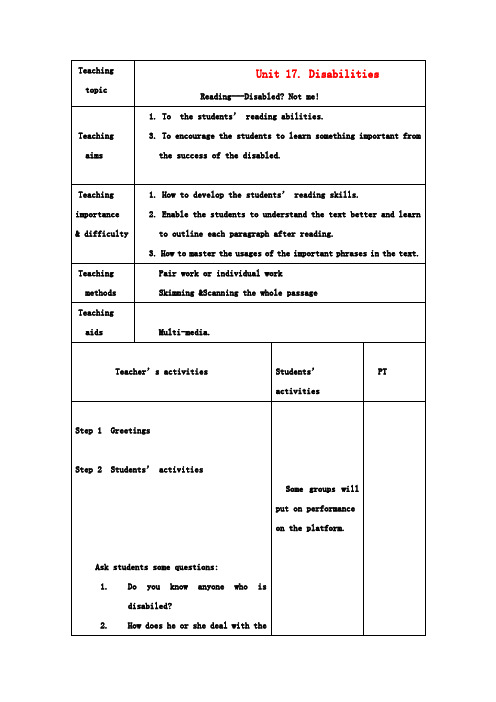
nguage points:
Wish
I know people are trying tothis way can we get around the
4.adjust
“整理”
e.g. She carefully adjusted adjusted (herself) to the country life.
3. How to master the usages of the important phrases in the text.
Teaching
methods
Pair work or individual work
Skimming &Scanning the whole passage
Teaching
The thought after teaching:
.
8mins
5minsБайду номын сангаас
6mins
Step3. Let’s watch a short play.
What’s your feeling after the play?
Teacher’s activities
Some groups will put on performance
on the platform.
Students’ activities
Part3 (para4-5)
The introduction to the magazine for the disabled.
Part4 (para6)
Xiaowen’s advice to those who living with the disabled.
【精品】高中英语(人教大纲)第二册下:Unit17 Disabilities(备课资料)
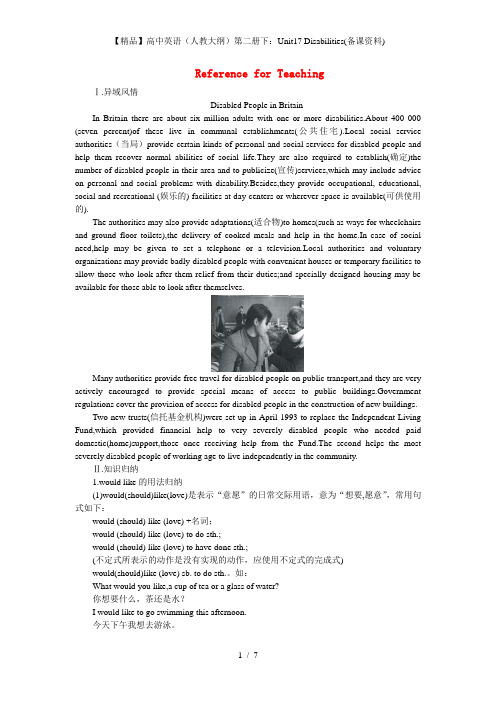
Reference for TeachingⅠ.异域风情Disabled People in BritainIn Britain there are about six million adults with one or more disabilities.About 400 000 (seven percent)of these live in communal establishments(公共住宅).Local social service authorities(当局)provide certain kinds of personal and social services for disabled people and help them recover normal abilities of social life.They are also required to establish(确定)the number of disabled people in their area and to publicize(宣传)services,which may include advice on personal and social problems with disability.Besides,they provide occupational, educational, social and recreational (娱乐的) facilities at day centers or wherever space is available(可供使用的).The authorities may also provide adaptations(适合物)to homes(such as ways for wheelchairs and ground floor toilets),the delivery of cooked meals and help in the home.In case of social need,help may be given to set a telephone or a television.Local authorities and voluntary organizations may provide badly-disabled people with convenient houses or temporary facilities to allow those who look after them relief from their duties;and specially designed housing may be available for those able to look after themselves.Many authorities provide free travel for disabled people on public transport,and they are very actively encouraged to provide special means of access to public ernment regulations cover the provision of access for disabled people in the construction of new buildings.Two new trusts(信托基金机构)were set up in April 1993 to replace the Independent Living Fund,which provided financial help to very severely disabled people who needed paid domestic(home)support,those once receiving help from the Fund.The second helps the most severely disabled people of working age to live independently in the community.Ⅱ.知识归纳1.would like的用法归纳(1)would(should)like(love)是表示“意愿”的日常交际用语,意为“想要,愿意”,常用句式如下:would (should) like (love) +名词;would (should) like (love) to do sth.;would (should) like (love) to have done sth.;(不定式所表示的动作是没有实现的动作,应使用不定式的完成式)would(should)like (love) sb. to do sth.。
高中英语 Unit 17 Disabilities知识精讲 人教版第二册
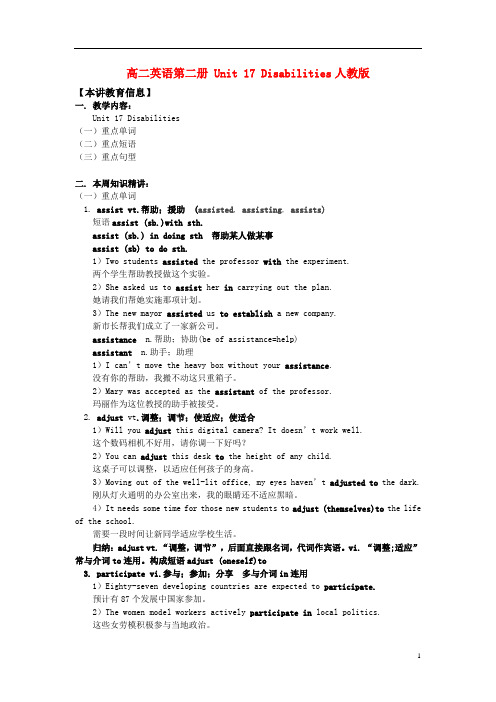
高二英语第二册 Unit 17 Disabilities人教版【本讲教育信息】一. 教学内容:Unit 17 Disabilities(一)重点单词(二)重点短语(三)重点句型二. 本周知识精讲:(一)重点单词1. assist vt.帮助;援助 (assisted, assisting, assists)短语assist (sb.)with sth.assist (sb.) in doing sth 帮助某人做某事assist (sb) to do sth.1)Two students assisted the professor with the experiment.两个学生帮助教授做这个实验。
2)She asked us to assist her in carrying out the plan.她请我们帮她实施那项计划。
3)The new mayor assisted us to establish a new company.新市长帮我们成立了一家新公司。
assistance n.帮助;协助(be of assistance=help)assistant n.助手;助理1)I can’t move the heavy box without your assistance.没有你的帮助,我搬不动这只重箱子。
2)Mary was accepted as the assistant of the professor.玛丽作为这位教授的助手被接受。
2. adjust vt.调整;调节;使适应;使适合1)Will you adjust this digital camera? It doesn’t work well.这个数码相机不好用,请你调一下好吗?2)You can adjust this desk to the height of any child.这桌子可以调整,以适应任何孩子的身高。
【精品】高中英语(人教大纲)第二册下:Unit17 Disabilities(第三课时)

The Third PeriodTeaching Aims:1.Review the words and phrases learned in the last two periods.2.Learn and master Direct and Indirect Objects.Teaching Important Points:1.How to guess the missing word according to the given sentence.2.Master the interchanges of position on direct and indirect objects in the sentence.Teaching Difficult Point:Master the changes of the prepositions in the interchanges of direct and indirect objects.Teaching Methods:1.Review method to consolidate the words learned in the last two periods.2.Explanation and inductive methods to make the students master the interchanges of direct and indirect objects.3.Individual,pair work to make every student work in class.Teaching Aids:1.the blackboard2.the multimediaTeaching Procedures:Step ⅠGreetingsGreet the whole class as usual.Step ⅡWord StudyT:In the last two periods,we have learned something about disabilities.As we all know,we shouldn’t look down upon the disabled.We should help and respect them.And we must make life easier for them.All these include some useful and important words and phrases.Now let’s review them.Open your books and turn to Page 53.Look at Word Study.Part 1:Fill in the blanks with the right words.Part 2:Use the correct form of the words in the box to describe the following things or people.You are given ten minutes to do them.Read first,then fill in them according to the meaning of each sentence.Is that clear?Ss:Yes.T:OK.First do it by yourself.Then discuss them in pairs.After a while,I’ll ask some students to read the words.(Teacher goes among the students and the students begin to do it.After a while,teacher checks their answers.)Suggested answers:1.①waist ②guidance③sympathy ④physical⑤potential ⑥gifted⑦meaningful ⑧limit⑨overcome ⑩adjust2.①frustrated ②challenging③disabled ④motivated⑤encouraged ⑥disappointed⑦rewardingStep Ⅲ Grammar StudyT:Now I want you to translate two sentences into English.Look at the screen.(Show the following on the screen.)T:Here I tell you how to say “民间乐曲”in English —folk music.Now can you translate the two sentences?Who wants to try?Yeah,Zhao Nan,you try the first one,please.S 1:Pass me the salt,please.T:Good,sit down,please.Now we can also say:Pass the salt to me,please.(Write the two sentences on the blackboard.)Now the second one.Who wants to try?OK.Peter,you try,please.S 2:Play us some folk music,please.S 3:We can also say:Play some folk music for us,please.T:Very good,sit down,please.(Write the two sentences on the blackboard.)Look at the blackboard,the verbs “play ”and “pass ”are followed by two objects.In English,there are some verbs that can be followed by two objects.Who can tell us what they are?S 4:I ’ll try.They are send,buy,get …T:Right.You ’ve known some of the verbs.Now I ’ll give you a summary.Please look at the screen.(Show the following on the screen.)objects are transformed into “to-phrase ”.And in Group 2,most of the indirect objects are transformed into “for-phrase ”.(Write the following on the blackboard.)Compare:⎩⎨⎧ow.you tomorr book to return the Ill row.book tomor you the return Ill ⎩⎨⎧you? will us,for chairs few a Fetchyou? will chairs, few a us Fetch Is that clear?Ss:Yes.T:But not all the indirect objects can be replaced like this.e.g.“Do me a favour ”.We can ’t transform it into:“Do a favour for me.”OK.Now let’s do some exercises.Open your books and turn to Page 54.Look at Grammar—Direct and Indirect Objects.Look at Part 1.Tick the right answer.First do it by yourselves.Then discuss it in pairs.Finally I’ll show you the answers.(After students finish it,teacher shows the following on the screen.)Suggested answers:1.√Because his mother bought him a computer.√Because his mother bought a computer for him.2.√Do me a favour.Please lend me one yuan.3.√Please take these exercise-books to my office.4.√Give me the check,please.√Please give the check to me.T:OK.In fact,we should pay attention to some special cases.Especially when the direct object is shorter than the indirect object,or when we emphasize the indirect object,we often use such patterns,“Subject+Predicate+Direct Object+to/for+Indirect Object”.e.g.I took it to the policeman on duty.Mother bought the ice-cream for you,not for me.(Write them on the blackboard.)And there are two special cases you should notice.Please look at the screen.(Show the following on the screen.)1.We must use prepositions before the indirect object following the two verbs “explain and suggest”.e.g.Could you explain your point of view to us?I suggest a way out to her.2.Some verbs are followed by either direct object or indirect object,or both of them.e.g.I asked John.I asked a question.I asked John a question.The similar verbs are:teach,tell,owe,pay,showAs to this,you should remember them.Is that clear?Ss:Yes.T:OK.Let’s deal with Part 2.(Teacher begins to read the following and explains it if necessary.Summer is coming.You decide to have a different vacation this e the words in brackets to explain what you will do differently this summer.)Now you are given five minutes to do it.First do it by yourself.Then discuss it in pairs.Now please begin.(Teacher goes among the students to check their writing and explains some new words that students meet with and ask.As to some difficult sentences,teacher and students can discuss together.At last,teacher shows the answers on the screen.)Suggested answers:1.This summer,I want to make my parents less trouble by staying at home.2.This summer my grandpa wants to buy some books for me.3.This summer my friends want to send short messages to me.Step ⅣPractice(The teacher shows the following on the screen)(Give the students several minutes to practise them,then teacher may check their practice.) Suggested answers:1.I’ll lend some to you.2.He gave a camera to his wife for Christmas.3.We’re going to sing the heroes some songs.4.Bring the book to me.5.She made me a coat.6.He bought his teacher flowers.Step ⅤSummary and HomeworkT:In this class,we’ve reviewed some new words and mainly done some exercises about direct and indirect objects.After class,review the content,and remember the verbs that can be followed by double objects.Today’s homework:Preview the integrating skills.That’s all for today.Goodbye,everyone.Step ⅥThe Design of the Writing on the BlackboardStep ⅦRecord after Teaching。
高考英语 备考BookII Unit17 Disabilities 知识搜索与探究归纳
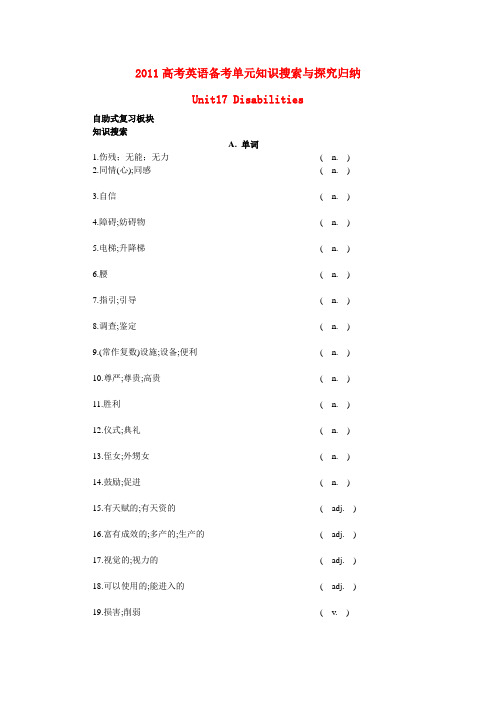
2011高考英语备考单元知识搜索与探究归纳Unit17 Disabilities自助式复习板块知识搜索A. 单词1.伤残;无能;无力(n.)________________2.同情(心);同感(n.)________________3.自信(n.)________________4.障碍;妨碍物(n.)________________5.电梯;升降梯(n.)________________6.腰(n.)________________7.指引;引导(n.)________________8.调查;鉴定(n.)________________9.(常作复数)设施;设备;便利(n.)________________10.尊严;尊贵;高贵(n.)________________11.胜利(n.)________________12.仪式;典礼(n.)________________13.侄女;外甥女(n.)________________14.鼓励;促进(n.)________________15.有天赋的;有天资的(adj.)_______________16.富有成效的;多产的;生产的(adj.)_______________17.视觉的;视力的(adj.)_______________18.可以使用的;能进入的(_______________19.损害;削弱________________20.合作;协作________________21.使有动机;激发________________答案:1.disability 2.sympathy 4.obstacle 5.elevator7.guidance8.survey11.victory14.encouragement17.visual20.cooperate21.motivateB. 短语22.发展他们的潜力_______ _______ ________23.对社会作贡献_______ _______ _______ _______ _______24.建立一所特殊的教育学院_______ _______ _______ _______ _______25.在社会中扮演了重要的角色_______ _______ _______ _______ _______ ______26.一种强烈的团结和友谊意识a _______ _______ _______ _______ and _______27.在多方面_______ _______ _______ _______ _______28.参加_______ _______答案:22.unity, friendshiC. 句型29. Obviously, Xiaowen’→______ ______ ______ that Xiaowen’s life is different.30. They not only need sympathy and help,→They need recognition, _______ _______ sympathy and help.答案:29.It is obvious30.more thanD. 语法31.他只给了我们两个钟头收拾行李。
【精品】高中英语(人教大纲)第二册下Unit17 Disabilities(备课资料)
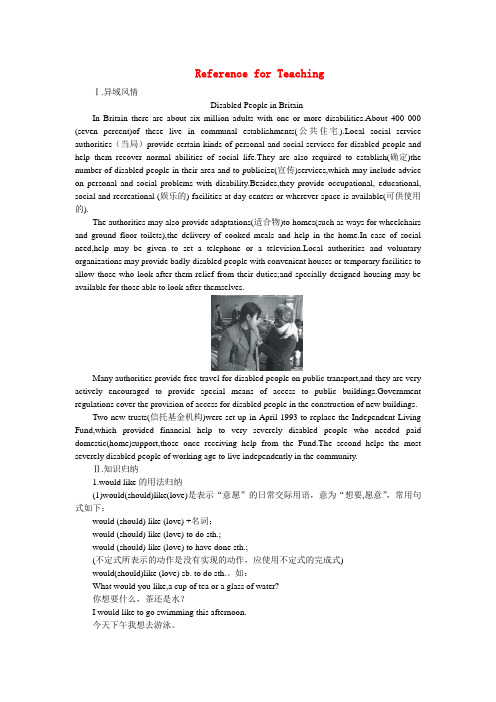
Reference for TeachingⅠ.异域风情Disabled People in BritainIn Britain there are about six million adults with one or more disabilities.About 400 000 (seven percent)of these live in communal establishments(公共住宅).Local social service authorities(当局)provide certain kinds of personal and social services for disabled people and help them recover normal abilities of social life.They are also required to establish(确定)the number of disabled people in their area and to publicize(宣传)services,which may include advice on personal and social problems with disability.Besides,they provide occupational, educational, social and recreational (娱乐的) facilities at day centers or wherever space is available(可供使用的).The authorities may also provide adaptations(适合物)to homes(such as ways for wheelchairs and ground floor toilets),the delivery of cooked meals and help in the home.In case of social need,help may be given to set a telephone or a television.Local authorities and voluntary organizations may provide badly-disabled people with convenient houses or temporary facilities to allow those who look after them relief from their duties;and specially designed housing may be available for those able to look after themselves.Many authorities provide free travel for disabled people on public transport,and they are very actively encouraged to provide special means of access to public ernment regulations cover the provision of access for disabled people in the construction of new buildings.Two new trusts(信托基金机构)were set up in April 1993 to replace the Independent Living Fund,which provided financial help to very severely disabled people who needed paid domestic(home)support,those once receiving help from the Fund.The second helps the most severely disabled people of working age to live independently in the community.Ⅱ.知识归纳1.would like的用法归纳(1)would(should)like(love)是表示“意愿”的日常交际用语,意为“想要,愿意”,常用句式如下:would (should) like (love) +名词;would (should) like (love) to do sth.;would (should) like (love) to have done sth.;(不定式所表示的动作是没有实现的动作,应使用不定式的完成式)would(should)like (love) sb. to do sth.。
高二英语Unit17 Disabilities知识点总复习教案

高二英语Unit17 Disabilities知识点总复习教案-高二英语Unit17 Disabilities知识点总复习教案Setin I 前准备、听力、口语1 Tal abut disabilit? 谈一谈残疾(p 49 Gal 1)* disabilit和inabilit▲dis-和in-都是表示否定意义的前缀,但用在abilit前,表示不同的意思,disabilit意为“残疾”,而inabilit意为“无能力”“没办法”。
请比较下列例句,注意这两个词的不同意思。
①I as surprised at her inabilitt d things prptl 她不能迅速处事,我感到惊异。
②She is deaf,but refuses t let her disabilit prevent her fr ding hat she ants t d 她失聪,但她不让自己的残疾妨碍自己去做想做的事。
③His inabilit t pa his debts ade his parents rried 他无力偿还债务使他父母亲很着急。
④Her la f experiene is a severe disabilit 她缺少经验是一个严重的障碍。
【注】abilit的形容词是able,其前也有两个否定前缀,dis-和an-表示不同的意思,disable是动词,意为“使……伤残”,而unable则是形容词,表示“不能的”“不会的”。
如:①That illness disabled hi and lefthi unable t r 那病使他残疾,不能工作。
②An aident disabled hi fr teahing 一次交通事故使他再也不能教书了。
③He sees unable t他看似乎连最简单的说明也不懂。
④instrutins siplest the understand He as unable t sleep at night beause f his anxiet 他因焦虑而晚上睡不着。
高二英语Unit17Disabilities知识点总复习教案

高二英语Unit17Disabilities知识点总复习教案SectionIII词汇语法、综合技能Everyfouryears,entallydisabledathletesetogethertota epartintheSpecialolypics.智障运动员每四年聚会一次,参加特殊奥运会。
*every的一种用法▲此处every用在数词前,如everyto,意为“每两个个……”。
如:①Igothereeverythreedays.我每三天去那里一次。
②TheAericanpeopleelectapresidenteveryfouryears.美国人四年选一次总统。
③Thereisabustothestationeveryteninutes.每十分钟有一辆公共汽车进站。
④Theystoppedandrestedeveryfiveiles.他们每五英里停下来休息一会儿。
⑤Nineoenhavelostjobsforeveryfiveen.每五个男子失业就有九个女子失业。
【注】也可以跟序数词表示同样的意思。
如:①Theolypicsareheldeveryfourthyear.奥林匹克运动会每四年举行一次。
②Ithasbeensnoing,roughlyeverythirdday.近来大约每三天就要下一次雪。
【注】值得注意的是表示“每隔……”。
要用everyother 或everysecond。
如“每隔一天”,要说everyotherday或everysecondday。
①Ienthoeeveryotheree.我每隔一周回家一次。
②"Pleaseriteeveryotherline."saidtheteacher.老师说:“请隔行写”。
justlietheregularolypicGaes,theeventsaresurroundedb ygrandcereonyand…正如通常举办的奥运会一样。
高二英语Unit17Disabilities知识点总复习教案-
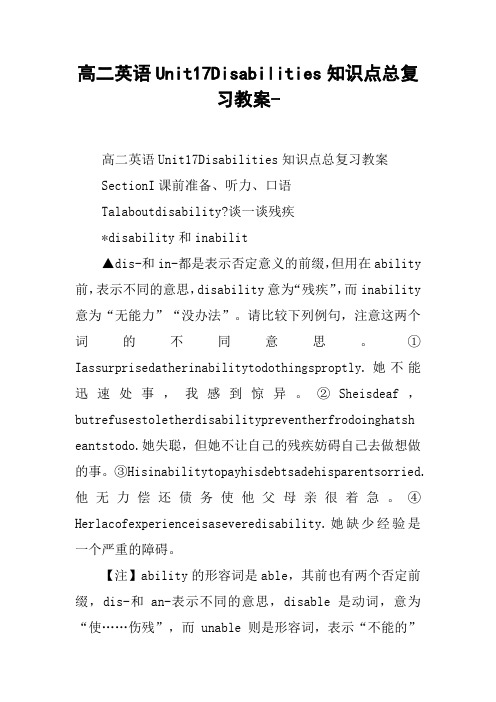
高二英语Unit17Disabilities知识点总复习教案-高二英语Unit17Disabilities知识点总复习教案SectionI课前准备、听力、口语Talaboutdisability?谈一谈残疾*disability和inabilit▲dis-和in-都是表示否定意义的前缀,但用在ability 前,表示不同的意思,disability意为“残疾”,而inability 意为“无能力”“没办法”。
请比较下列例句,注意这两个词的不同意思。
①Iassurprisedatherinabilitytodothingsproptly.她不能迅速处事,我感到惊异。
②Sheisdeaf,butrefusestoletherdisabilitypreventherfrodoinghatsh eantstodo.她失聪,但她不让自己的残疾妨碍自己去做想做的事。
③Hisinabilitytopayhisdebtsadehisparentsorried.他无力偿还债务使他父母亲很着急。
④Herlacofexperienceisaseveredisability.她缺少经验是一个严重的障碍。
【注】ability的形容词是able,其前也有两个否定前缀,dis-和an-表示不同的意思,disable是动词,意为“使……伤残”,而unable则是形容词,表示“不能的”“不会的”。
如:①Thatillnessdisabledhiandlefthiunabletoor.那病使他残疾,不能工作。
②Anaccidentdisabledhifroteaching.一次交通事故使他再也不能教书了。
③Heseesunabletounderstandthesiplestinstructions.他看来似乎连最简单的说明也不懂。
④Heasunabletosleepatnightbecauseofhisanxiety.他因焦虑而晚上睡不着。
- 1、下载文档前请自行甄别文档内容的完整性,平台不提供额外的编辑、内容补充、找答案等附加服务。
- 2、"仅部分预览"的文档,不可在线预览部分如存在完整性等问题,可反馈申请退款(可完整预览的文档不适用该条件!)。
- 3、如文档侵犯您的权益,请联系客服反馈,我们会尽快为您处理(人工客服工作时间:9:00-18:30)。
2011高考英语备考单元知识搜索与探究归纳Unit17 Disabilities自助式复习板块知识搜索A. 单词1.伤残;无能;无力( n. )________________2.同情(心);同感( n. ) ________________3.自信( n. ) ________________4.障碍;妨碍物( n. ) ________________5.电梯;升降梯( n. ) ________________6.腰( n. ) ________________7.指引;引导( n. ) ________________8.调查;鉴定( n. ) ________________9.(常作复数)设施;设备;便利( n. ) ________________10.尊严;尊贵;高贵( n. ) ________________11.胜利( n. ) ________________12.仪式;典礼( n. ) ________________13.侄女;外甥女( n. ) ________________14.鼓励;促进( n. ) ________________15.有天赋的;有天资的( adj. ) _______________16.富有成效的;多产的;生产的( adj. ) _______________17.视觉的;视力的( adj. ) _______________18.可以使用的;能进入的( adj. ) _______________19.损害;削弱( v. ) ________________20.合作;协作( v. ) ________________21.使有动机;激发( v. ) ________________答案:1.disability 2.sympathy 3.self confidence 4.obstacle 5.elevator 6.waist 7.guidance8.survey9.facility 10.dignity 11.victory12.ceremony 13.niece 14.encouragement15.gifted 16.productive17.visual18.accessible 19.impair20.cooperate21.motivateB. 短语22.发展他们的潜力_______ _______ ________23.对社会作贡献_______ _______ _______ _______ _______24.建立一所特殊的教育学院_______ _______ _______ _______ _______25.在社会中扮演了重要的角色_______ _______ _______ _______ _______ ______26.一种强烈的团结和友谊意识a _______ _______ _______ _______ and _______27.在多方面_______ _______ _______ _______ _______28.参加_______ _______答案:22. develop their potential 23.make a contribution to society unch a special education college 25.play a valuable role within society 26.strong sense of unity, friendship 27.in more than one way 28.participate inC. 句型29. Obviously, Xiaowen’s life is different.→______ ______ ______ that Xiaowen’s life is different.30. They not only need sympathy and help, but recognition as well.→They need recognition, _______ _______ sympathy and help.答案:29.It is obvious30.more thanD. 语法31.他只给了我们两个钟头收拾行李。
He only allowed ______ _______ _______ to pack up.32.这样的安排可以省去我们很多麻烦。
Such an arrangement will spare ______ ______ ______.33.汤姆给杰克捎来个口信。
Tom passed _____ ______ ______ Jack.34.他在桌上给她留了个纸条。
He left ______ ______ ______ _______ on the table.答案: two much trouble33.a message to34.a note for her重难聚焦重点单词要点1fair【例题】Goods are sold at a ______ price in this store.A. equalB. fareC. fairD. fairly解析:根据句意“以公平的价格出售”,选C,fair“公平的”; equal “平等的”;fare“费用”;fairly“相当”。
答案:C归纳与迁移(1) adj.公正的;正直的As a judge,you must make a fair decision about which team won the game.作为一名裁判,你必须公正地判断哪个队在这次比赛中获胜了。
It’s not fair that he should have been given the prize.让他获奖是不合理的。
天气好,晴朗Every time they set out,they prayed for fair weather.每次出发,他们都祈祷有好天气。
We hope the weather will turn out to be fair tomorrow.我们希望明天的天气会是晴朗的。
(皮肤或头发)浅色,白皙He fell in love with a girl with fair hair and skin.他爱上了一位白皮肤、黄头发的姑娘。
(2) n. 集市;展览会;商品交易会The book fair brought his book to the public’s notice.这次书展使公众注意到了他的书。
要点2adjust【例题】After having studied abroad for many years,he______ the way of life in the USA.A. adjusted withB. has adjusted himself toC. had adjusted withD. adjusted himself for解析:adjust (oneself/sth.) to sth.使……适应,适合。
答案:B归纳与迁移(1)整顿,安排She carefully adjusted her clothes and her hair before going out.在出门之前,她仔细地整了整衣服和头发。
(2)校准,校正I must adjust my watch. It’s slow.我得调整我的手表了,它走慢了。
You have to adjust the brake. It is dangerous.你必须调节一下制动器,太危险了。
(3)使……适应,适合adjust (oneself/sth.) to sth.He adjusted (himself) very quickly to the heat of the country.他很快适应了这个国家的酷热天气。
The body quickly adjust itself to changes in temperature.身体迅速自行调节以适应气温的变化。
重点短语要点1be aware of【例题】Susan was well _______ of Sara’s fear of heights.A. awareB. knownC. clearD. reward解析:句意为“苏珊很清楚萨拉恐高”。
be aware of “意识到,知道”;be clear of“摆脱债务、烦恼等”。
答案:A归纳与迁移be aware of/that...;make sb. aware ofI was not aware of the fire.我没有意识到火。
We were quite aware (of) how you would respond to our terms.我们十分清楚你们对我们提出的条件肯定会有什么反应。
The principal didn’t seem to be aware that there should have been so much dispute about the decision.校长好像没有意识到这个决定竟会有这么多分歧。
It’s time that we made him aware of his action.是我们让他知道自己行为的时候了。
要点2be proud to do【例题】She was______ to be part of such a famous project.A. prideB. persuadedC. proveD. proud解析:be proud to do“感到得意、自豪、荣耀”。
答案:D归纳与迁移感到得意、自豪、荣耀(1)be proud to do; be proud of; be proud thatHe is proud of his daughter’s ability to speak four languages .他为女儿能说四种语言而骄傲。
Our football team feels proud that it has won every match this year.我们的足球队对今年战无不胜甚感自豪。
He is proud that his wife is so clever.他的妻子非常聪明,为此他引以为豪。
(2)be proud to be a scientist 做个科学家很光荣He’s too proud to be seen in public with his poorly-dressed mother.他非常傲慢,不愿在公共场所被人看见和衣衫褴褛的母亲在一起。
